One of the main goals when creating this site, was to open channels for debate. This post will hopefully do that by discussing war comedy TV Shows and films too. As such, my choices are those that I know but also maybe a couple that are contentious to stimulate debate. As always, the purpose is to encourage reading around the topic, so the debate is relevant and informed.
However, some of the content of this post relies a lot on gut feeling because it is about what people find funny. I was a history teacher for over twelve years and taught aspects of the Holocaust to several year groups. As part of this teaching, I would show the 12–13-year-olds the film Life Is Beautiful. 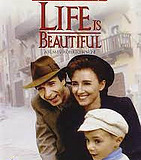
Before I began, I would ask these students several questions that would underline the topic and note their gut feelings on the topic.
1. Should movies be used in history teaching?
2. Should the Holocaust be taught in schools?
3. Should a comedy film have been made about the Holocaust?
I would get a show of hands from each class, their gut feelings, and discuss their answers.
The majority would answer yes to 1 and 2 and no to 3. After showing them the film, I would ask the same questions, hoping their answers might change. More often than not, after watching the film, their answers, particularly to question three would become more positive.
It is around the subject of telling history through comedy that this post will be based on. A quick Google for Second World War comedy films threw up a couple of Top 100 lists, which was more than I was expecting. I am going to pick out a couple of these and a couple of TV series too. Catchphrases are common in comedy, and these shows and films are no exception.
Don’t Panic – You stupid boy!

Dad’s Army is a British classic that regularly achieved 18.5 million viewers (to put this in some context, Dad’s Army was first shown in the UK in 1968, the 1966 World Cup Final was shown on two of the three channels available and had 32.3 million viewers) and has been a part of British culture since it was first aired.
It considers the adventures of the Walmington-on-Sea Local Defence Volunteers or The Home Guard. It ran for nine series and eighty episodes, there was a stage show, a radio version, a film, and a more recent remake in 2016 (the only one that did not do that well).
It was probably so widely appreciated because everyone could see someone they knew (or themselves) in the characters. It either epitomises or was the creator of the idea of the bumbling British response to the defeat at Dunkirk that has become, maybe detrimentally, many peoples’ perception of the British approach to the whole war and not just the Home Guard.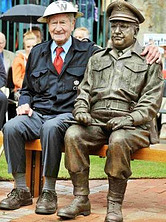 There are pubs and statues honouring characters.
There are pubs and statues honouring characters.
I guess the platoon was a collection of characters from many facets of British society at the time. From a historian’s point of view, there are a couple of major exceptions, there were many farmers and factory workers who were often younger than the characters in the Walmington-on-Sea platoon.
Many of the characters had their catchphrases and these have become engrained within British culture. Many a time, I have been on the receiving end of a; ‘You stupid boy!’ a la Captain Mainwaring. I have also often thought that; ‘we’re doomed’. I must keep telling myself; ‘don’t panic’ every time my finger hovers over the publish button for these blogs.
Shut Up!
Probably the most contentious choice in this post. It Ain’t Half Hot Mum was written by the same duo who wrote Dad’s Army. It often achieved seventeen million viewers, not too far behind their previous work, so at the time was a success. It considers the men involved in a Royal Artillery concert party and their continuous attempts to stay away from the front lines.
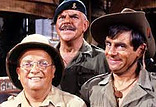
In the same way that historians often write their works within the context and biases of the time that they write them, TV shows and films are often representative of the time they are produced. In hindsight and as beliefs change, this can cause problems for future viewers. The underlying racism and homophobia are the culprits here.
From a history teacher’s perspective, it does tick a positive box or two. As the writers both served in that theatre and similar roles, they are fundamentally reliable even with some artistic license in play. In this way, there is also an argument for saying that the show depicts what people said, thought, and acted at both the time it was set and when the show was produced.
I would be interested in your thoughts on this.
‘Good Moaning, I was pissing by the door’.
To circumvent the fact that there were characters from four different countries in ‘Allo ‘Allo, the writers, Croft et al, decided all of them would speak English but in an exaggerated foreign accent.
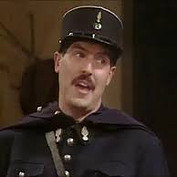
This theatrical device was taken one step further with the character of a British spy posing as a French police officer not being able to pronounce French phrases like, ‘Good Morning,’ and ‘I was passing by the door.’
The third and final TV series considered in this blog and also the third written by David Croft. It considers the farcical situations that Renée, a café owner, finds himself in with his dealings with the French Resistance, German and Italian occupiers, the Gestapo, and all their attempts to secure possession of the Fallen Madonna with the Big Boobies.
From a historian’s point of view, considering three series that all have the same writer is hardly good practice, but they are such an important part of the British memory of the war because they dominated much of the remembrance for decades of viewers. ‘Allo ‘Allo is worth a watch as are the other two series.
I watched all three of these with my family as a child and teenager. ‘Allo ‘Allo is the one that I remember the most even though there’s hardly a week without Dad’s Army being on a channel somewhere. If any of them made people dig out a book to check their veracity, then they were worthwhile.
Buongiorno Principessa
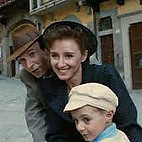
This is a story of love and the human spirit with the backdrop of the increasing intolerance of a Fascist Italy towards its Jewish inhabitants. The main protagonist is Guido, a Jewish man, who begins as a waiter before owning his own bookshop. He falls in love with Dora, (the Principessa greeted in the title) a gentile, they court, marry, and they have a son, Giosue.
It is from his son that he hides the true horrors of the developing Holocaust using slapstick comedy. He ultimately convinces Giosue that the concentration camp they are sent to is just a game in which they must earn 1000 points to win the grand prize (no spoilers for what this prize is here).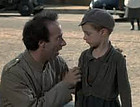
To the very end, much of the comedy revolves around ridiculing the perpetrators. The comedy is intermingled with Guido’s attempts to stay in contact with Dora when they are separated in the camp.
The terrible events that the film cannot ignore tend to happen out of shot, whether this be vandalised horses or graffitied buildings. This is most noticeable as the film reaches its conclusion and as the camp is being cleared out before the advancing Allies.
More than any other series or film discussed here, the comedy makes the moving moments even more poignant none more so than in the concluding few minutes of the film, where an adult Giosue realises what his father had done for him.
Jojo Rabbit

The story of a ten-year-old member of the Deutsches Jungvolk (junior Hitler Youth) whose imaginary friend is Hitler hardly sounds like a comedy great in the making. It is also a love story set against the backdrop of the horrors of the Holocaust. It is also like Life Is Beautiful because it is about a parent and other adults protecting children from these horrors.
It is different because the child is initially in agreement with antisemitism who then, through love, turns away from it. Unlike all the other shows and films discussed here, I have only seen this once and it is worth another viewing to garner the other nuances that occur in the story.
Final thoughts
I believe that telling the story of war using comedy is useful and necessary. After all, humour is often a way that the military themselves deal with the extreme situations in which they find themselves.
Humour is a very personal thing. In a society of cancel culture, where ‘keyboard warriors’ can force trends for and against something because it offends them (I see the irony here believe me), the best of the writers can still find the comedy in the darkest of situations. I have two anecdotes that I believe go some way to supporting these ideas.
The first is that in 2009, Jimmy Carr told an infamous joke about amputee servicemen and the 2012 Olympics. The pillorying he received was probably only surpassed by his later tax evasion issues (not sure what kind of comment this makes about the modern media and society). He defends himself saying that many service personnel attend his gigs and have continued to despite the joke. Some have even gone out of their way to tell him they found the joke funny.
The second is an example of military humour. During an operation in Afghanistan where the SAS were attacking an opium-producing factory, a soldier was wounded. His colleagues administered first aid. This involved injecting him with morphine. Another soldier allegedly quipped along the lines of, ‘Does anyone else see the irony in injecting him with morphine when we’re trying to destroy an opium factory?’
To further illustrate my final point and ask my final question, I am going to use a TV series whose final series was set in another war and whose previous series dealt with other historical periods. This is a Second World War site, but I make no apology for discussing the First here.
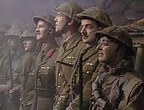
Blackadder Goes Forth is set on the Western Front in the First World War. Very little of the war is left untarred by the comedic brush and few would argue that it is not a tour de force. Few would also argue that the final scene of the final episode is made more poignant by being juxtaposed with the comedy just before it.
Though about the First World War, Blackadder Goes Forth, demonstrates a couple of things that are relevant here. Firstly, there is often humour in abundance to be found in the most horrible of historical events. Secondly, when is it too soon to make comedy about serious events?
My final, final point, promise!
One of the goals of producing any form of media about historical events is to make money. However noble anyone who produces such material is or says they are, making money is the goal somewhere and it is one of my goals too. People do say you should get someone to pay you for your hobby.
The Second World War has been a big earner in this way and the plethora of recently released and soon-to-be-released films, documentaries and books demonstrates the almost endless possibilities to do so. Long may it last.
Cheers for having a read. Any comments will be greatly appreciated.
All the best
BigT

Life Is Beautiful is the best film ever captured by a camera. I appreciate what you’re saying but to describe it as a comedy doesn’t do it justice. It’s more than comedy, more than romance, more than drama, more than a war film. It’s beautiful.
Hi Griff, thank you for taking the time to have a read and make a comment. I love the film, that’s why I decided to show that particular one to hundreds of pupils. It really is beautiful and I do not deny that it is far more than just comedy. However, this blog was primarily focusing on coemdy in war films and TV shows. I could write far more about it considering all the aspects that you mention and some more too and I may do in the future.
Being a rambling ex history teacher, I probably could not do it in a more succinct way than you have. So thank you again.
Bigt
Isn’t telling the story accurately more important than the genre chosen to do it?
This is a great article T and I don’t see harm in the juxtaposition of comedy and the horror of war.
When I read ‘Maus’ I was cautious because (apart from the 70’s classics – Commando comic obviously) I couldn’t see how a graphic novel was an appropriate medium. How wrong was I?
Thank you for taking the time to read this article Steve and thank you for commenting too.
I do not see the harm in juxtaposing the horror of war and comedy. I was maybe a bit prejudiced before I had seen LIB (I cannot remember if I’m honest) and I guess I wanted to ‘test’ other people’s prejudice, even at a young age. Maybe it was a subcocious/ironic undertone to all I was teaching within that topic.
I agree that the genre is not important but how it’s done is and this does not necessarily have to be historically accurate. In a few blogs time, I will be discussing Saving Private Ryan. The second two and a half hours of that film is completely made up. A lot of the first half hour technically is too but Spielberg tried to make it as accurate as possible on many levels (discussing how would be a blog or three on its own!).
An example is the cameraman not being informed where the explosions would be so he would react in real time and amputees being used whenever someone loses a limb. It is hard to deny that the lengths he went to created a cinematic masterpiece. I saw it in the cinema and was exhausted afterwards, I turned to the person I was with and told them I was more than prepared to leave as I had got at least my monies worth.
Maus is also a fabulous piece of work. Might be a blog in that!
Thank you agian
All the Best
BigT